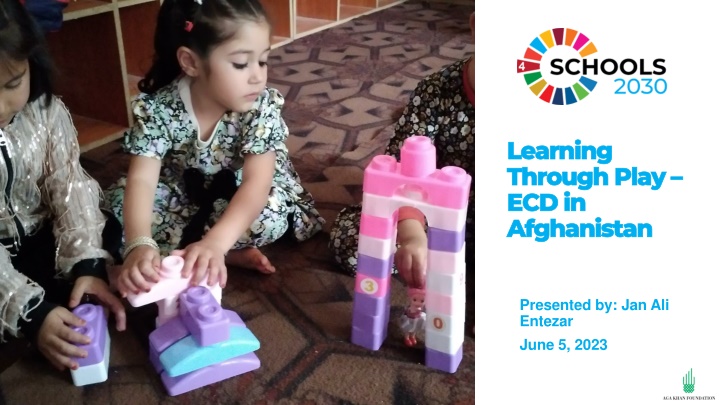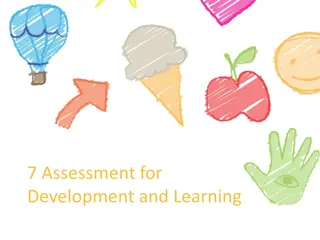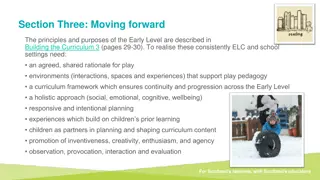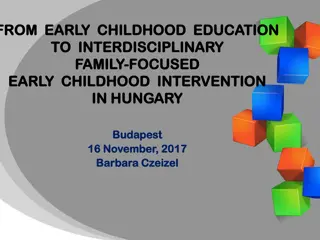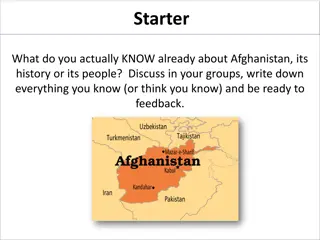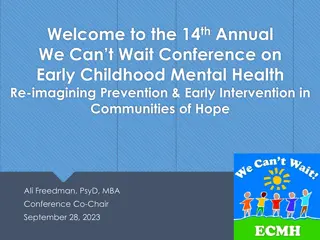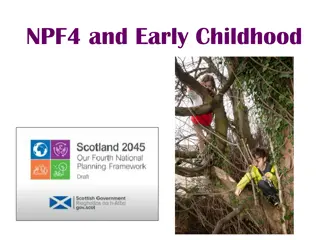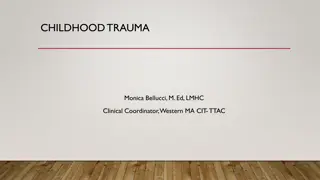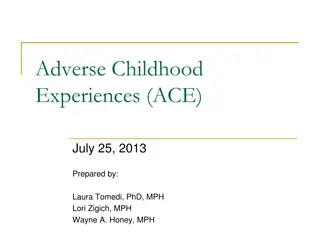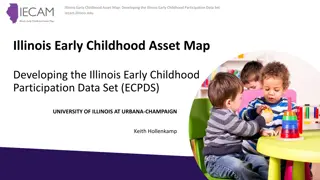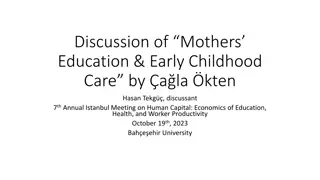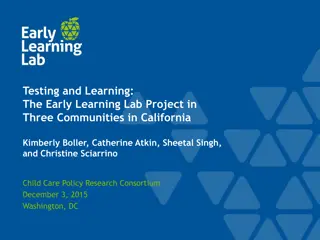Enhancing Early Childhood Development through Play-Based Learning in Afghanistan
Addressing the challenges faced in Early Childhood Development (ECD) in Afghanistan, this showcase focuses on improving student learning outcomes through play-based approaches. The initiative involves working closely with teachers and students to create a conducive play and learning environment, providing training on innovative teaching methodologies, and implementing the Human-Centered Design (HCD) process in ECD classes. By identifying and tackling key issues such as lack of resources, teacher training, and awareness, the program aims to enhance literacy, numeracy, health, nutrition, art, and creativity for young learners in Afghanistan.
Uploaded on Oct 04, 2024 | 1 Views
Download Presentation

Please find below an Image/Link to download the presentation.
The content on the website is provided AS IS for your information and personal use only. It may not be sold, licensed, or shared on other websites without obtaining consent from the author.If you encounter any issues during the download, it is possible that the publisher has removed the file from their server.
You are allowed to download the files provided on this website for personal or commercial use, subject to the condition that they are used lawfully. All files are the property of their respective owners.
The content on the website is provided AS IS for your information and personal use only. It may not be sold, licensed, or shared on other websites without obtaining consent from the author.
E N D
Presentation Transcript
Learning Learning Through Play Through Play ECD in ECD in Afghanistan Afghanistan Presented by: Jan Ali Entezar June 5, 2023
Welcome! Outline of today s showcase Introduction Jan Ali Entezar, National Manager Education Implementation, AKF- Afghanistan Showcase on Learning Through Play Presenting On behalf of Shakila and Qurban Begum, ECD teachers in Karte Khurasan high school in Baghlan Province, Afghanistan Closing remarks
The Challenge: Low Student Learning Outcomes in literacy, numeracy, health and nutrition, art, cooperation and creativity Social norms Lack of qualified teachers Lack of public awareness about ECD Limited mobility outside of community Poor Parent-child interaction Lack of understanding about the importance of play Not trained on holistic and innovative teaching and learning approaches/ student centered teaching methodologies; Lack of ECD teachers Policy and Strategy Poorly equipped facilities Lack of specific curriculum, policy and strategy for ECD Lack of policy makers awareness about ECD Poorly equipped ECD classrooms Lack of availability of play and learning materials at home and communities
Evidence of Challenge Review of assessment evidence The evaluation of the student s knowledge in ECD (Early Childhood Development) showed 69 % in literacy(Reading and writing) subject, 34% in numeracy subject, 44% in cooperation, 70% in art and culture, 47% in health & nutrition and 7% in creativity. Interview with Parents There is not any playing space or playground for children, and because of that, the children have no interest in participating in ECD class". Interviews with teachers ECD teachers need the most support/short- and long-term trainings on holistic and students centered teaching methodologies. lack of teaching & learning materials. Interviews with School heads School heads shared feedback on the biggest challenges that the teachers are not familiar with holistic, and students centered teaching methodologies, and as a result, the students face challenges in achieving their goals.
The Idea How will we solve the problem? 1. Idea: To work with each student and provide the play and games environment for the students to improve the student learning outcomes. 2. Teachers receive training on the HCD process 3. To assess the students and use the data in the HCD process 4. To implement the HCD process in the ECD class
Design Process | Empathy What did we learn from those we interviewed? 2 3 1 We noticed/ saw/heard There is not any playing space or playground for children, which affects children s interest in participating in ECD class. ECD teachers need the support on holistic and students centered teaching and learning approaches. lack of teaching & learning materials in the ECD class. Our insight Providing the play activities/environ ment for the ECD students will improve the students' learning outcomes We met Teachers, school leads, parents, and students
Prototyping and Testing So, we created and we learned Prototyping: 1. Provide the contents and topics of the training for the teachers and get their opinions. 2. Provision of teaching materials for prototype testing. 3. Equipping one of the classes in the school to hold a prototype testing session. 4. Preparation for two days of prototype testing, that in the first day AKF master trainer did some activities for teachers, and after that, the teachers practiced the activities in the class. 1 Assumptions: 1. The teacher is interested and actively participating in the training. 2. The teacher is interested to understand new teaching methods and activities. 3. The teacher learned new ECD activities. 4. The students participation in the class increased. 5. The student learns the lesson through play/games. 6. The learning outcomes of the students increased. Design Process 2 Learned: The testing prototype showed that all the students were active during activities, and the students were at the center of the activities and learned with each other to improve their literacy, numeracy, and non-academic skills. The activities were like play/games, and the implementation of the activities was as entertainment. The teachers said that implementing these activities would solve the learning problems. 3
About Innovation How we implemented our innovation 1 2 3 Key activities Resources Timeline 3 hours per day, 6 days a week, 3 Months. First letter collection game, Line puzzle game, Story telling, Teaching the alphabet to children by reading poetry, Play with Shapes, Make Shape Pictures, Play with Numbers, Happy games, and Cartoon drawing. Stationery for students, class kit, doctor set, kitchen set, story books, math kit, flash disk, LCD for showing the alphabet melody videos for academic parts, stipend for the teachers.
Creating Positive Change How will we know if our idea is successful? Assessment table Shows the positive change in learning outcomes Subject Baseline End Line Progress Reading & Writing 69% 84% 15% Numeracy 34% 85% 51% Cooperation 44% 85% 41% Art & Culture 70% 96% 26% Health & Nutrition 47% 99% 52% Creativity 7% 99% 92%
Call to Action What support do we need? 1 2 3 Schools Parents and Community to support the schools and motivate the students Qualified Teachers to implement holistic and innovative teaching and learning approaches Leads/Principals and Teachers Heads to support the teachers and provide opportunities
Closing Remarks To share the results/progress with other teachers at the schools To iterate and implement the successful innovation next academic year Improved quality and relevance of teaching and improved students learning outcomes (knowledge, value, attitudes, skills). Community and school support for ECD
Photos The design team is completing the launch phase to launch the challenge in the Karte Khurasan ECD center
Shogufa Design team members interviewing parents and students to explore the challenge or problem.
Shogufa Shogufa, Design team member is interviewing the teacher of the class , Design team member is interviewing the teacher of the class to explore the challenge or problem. to explore the challenge or problem.
First day of test prototype: Design Team is testing the prototype with the AKF Master trainer (Implementation of several ECD teaching activities with using of teaching materials in the classroom for teachers, as an example).
On the second day of the prototype test: The teacher practiced the activities, and the design team tested the determined assumptions in the Kharte Khurasan ECD center.
WITH MANY THANKS TO OUR GLOBAL COALITION OF PARTNERS
